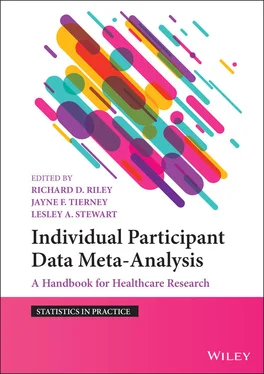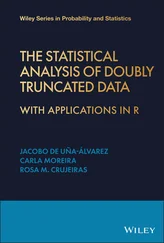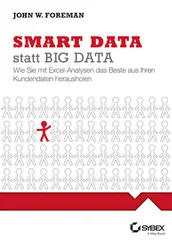3.2.2 IPD Meta‐Analysis Projects Using Data Repositories or Data‐sharing Platforms
An alternative, or complement, to obtaining IPD directly from trial investigators is to access IPD through a data repository or data‐sharing platform. In recent years, a number of these have been established to store, curate and share data from completed clinical trials ( Box 3.1). Although this is a welcome development and such repositories may have the potential to save time in obtaining IPD, experience of using them in the context of IPD meta‐analysis projects has thus far been limited and mixed. The process of gaining approval to access data can be lengthy, and the approach may not be time saving compared to contacting trial investigators directly. 74,75As the format and coding of IPD is likely to differ between the trials available through such repositories, and will need to be re‐coded for the IPD meta‐analysis project, the central research team may still need to consult with the original trial investigators, for example to clarify issues, recode variables, and obtain any required information that is missing from the repository materials. Restrictions on how repository data can be used may potentially limit their usefulness for some types of IPD meta‐analysis projects ( Sections 3.4and 4.4.5).
There are also a growing number of repositories that store IPD from studies of relevance to a particular healthcare area or topic (‘topic‐based repositories’). These may be established using the IPD collected for a completed IPD meta‐analysis project, to which additional trials may be added over time. For example, ACCENT is a topic‐based database developed from an IPD meta‐analysis of the efficacy of adjuvant fluorouracil and folinic acid for stage II/III colorectal cancer. 76Consequently, an important advantage is that IPD have already been coded to a common format and checked prior to their inclusion in the original IPD meta‐analysis. Although such repositories are often used as a resource for subsequent research carried out by the initial collaborative group, it may also be possible for others to gain access to the repository data. Clearly, if considering using such data from a repository for an IPD meta‐analysis, it is important to establish at the outset whether the repository data will be obtainable.
Box 3.1Examples of data‐sharing platforms and data repositories
Clinical Study Data Request (CDSR)( https://clinicalstudydatarequest.com/)
Includes access to data from a consortium of pharmaceutical companies including Astrellas Pharma, Bayer, Chugai, Esai, Novartis, ONO, Roche, Sanofi, Sunovion, Shiongi, UCB and ViiV; and academic research funders including the Wellcome Trust, the Bill and Melinda Gates Foundation, the UK Medical Research Council and Cancer Research UK. Lists anonymised data from over 3,000 studies (10 from academic funders). Data are provided in a secure analytic environment that includes free and open source analytic packages and software. Access to data is provided for 12 months that can be extended to 24 months. No charge for access is made.
DataSphere( https://www.projectdatasphere.org/)
Provides access to IPD from academic and industry phase III cancer clinical trials. Includes 160 datasets and data from over 10,000 patients. Data are made available within a secure environment that includes SAS analytic tools. Some data may be downloaded. No charge for access is made.
SOAR( https://dcri.org/our‐work/analytics‐and‐data‐science/data‐sharing/)
Co‐located with the Duke Databank for Cardiovascular Disease. Includes clinical study reports and de‐identified IPD from Bristol–Myers Squibb clinical trials for drugs licensed for use in the United States and Europe and completed after 2008. Information from terminated programmes to be available two years after discontinuation. Data are released to researchers and no charge is made.
Vivli( http://vivli.org/)
An independent repository and analytic platform providing access to IPD and metadata. Participating commercial partners include AbbVie, Biogen, Boehringer Ingelheim, Celgene, Daiichi‐Sanko, GSK, Lilly, Pfizer, Takeda, Tempus and UCB, along with a number of academic and charitable partners. Includes data from almost 5,000 clinical trials and 2.7 million participants. Data are accessed and analysed in a secure analytic environment that includes a number of commercial and open source software and analytic packages; data may also be downloaded with permission. Data access and use is free for a period after which a charge is made, currently $12 or $25 per day depending on whether their standard or premium research environment is being used.
Yale Open Data( http://yoda.yale.edu/)
Includes access to data from Johnson & Johnson and SI‐BONE Inc. and from Queen Mary University of London. Depending on the data partner, IPD are either made available in a personalised account on a secure data server or released using a secure electronic data transfer. No charge for access to data is made.
All platforms require submission of a research proposal that is reviewed before data are released, and are subject to data sharing agreements. Some publicly list applications and access decisions as well as publishing project findings. Information is correct as of March 2020. The status of platforms change frequently and up to date and further information should be sought from their websites.
Source: Lesley Stewart.
In the longer term, it may be possible to use trial data–sharing platforms and repositories to assemble complete IPD meta‐analysis datasets. However, as many IPD meta‐analysis projects will seek to include older or academic/non‐industry trials, neither of which are well represented in existing repositories, for the foreseeable future most IPD meta‐analyses will continue to be conducted by negotiating provision of IPD directly from and working with trial investigators. This may be supported or supplemented by obtaining IPD from repositories and data sharing platforms.
3.3 Developing a Project Scope
Developing a project scope is a good way of refining and developing the research question to be addressed, and rapidly prototyping key aspects of project design. A scope should be brief, perhaps around two to three pages in length, and capture the key aims and methods of the project including: the proposed inclusion and exclusion criteria, the main and other outcomes, and any important clinical subgroups and participant‐level variables of interest, such as those to be examined as potential effect modifiers. Careful specification of proposed inclusion and exclusion criteria in terms of the PICOS (Population, Intervention, Comparator, Outcomes, Study design) framework at the outset, and reference to them throughout the IPD meta‐analysis project, should ensure that the final results are clinically relevant and applicable as intended. If a collaborative approach is adopted, it may also be helpful to outline the terms of collaboration such as the publication policy (e.g. whether group or named authorship will be used, and how many group members/authors are allowed per trial), data safeguarding arrangements, and responsibilities of group membership. An example extract from the scope of an IPD meta‐analysis project is given in Box 3.2.
Feedback on a draft scope can be sought from a range of relevant stakeholders and experts, who may find it easier and be more inclined to comment on a short document than a full protocol, enabling the scope to be refined rapidly and iteratively. It can also be circulated to potential collaborators at an early stage of project development, perhaps when sounding out potential willingness to collaborate in the project, and may also serve as a basis for developing a funding application and the project protocol.
Читать дальше












